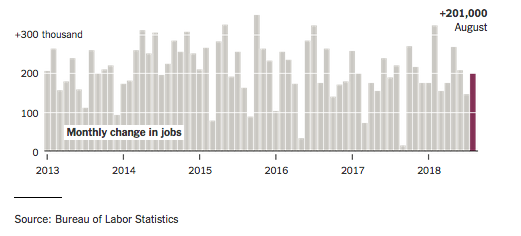The American economy’s stamina was showcased Friday as the government reported that wages in August sprinted forward at their fastest pace since the recession ended and that the job creation streak extended to 95 months.
But the Labor Department’s latest bulletin also hinted that President Trump’s tariffs could be starting to take a toll on manufacturing jobs.
“What’s worth noting is that even though there still remains a lot of headline noise around politics and protectionism, underneath that, the U.S. economy — and that includes labor markets — is doing quite fine,” said Michael Gapen, chief United States economist at Barclays.
Employers fattened payrolls by 201,000 jobs; the jobless rate remained under 4 percent, near territory not seen since the 1960s; and average hourly earnings rose by 10 cents, up 2.9 percent from a year earlier.
The manufacturing sector, however, which Mr. Trump has made a centerpiece of his economic and trade policies, registered fewer gains than had been previously thought. The combined addition of 93,000 jobs that the government originally reported for May, June and July was revised down to 62,000. And in August, the sector shed 3,000 jobs. The auto industry, which is particularly exposed to trade, eliminated 4,900 jobs last month after cutting 3,500 in July.
“You could tell the story that protectionism is taking some toll here,” Mr. Gapen said. “In most of the manufacturing indices, all showed a drop-off in new export orders.”
But other analysts warned against drawing too many conclusions from the latest payroll report — which excludes agriculture, an industry that is very vulnerable to trade tensions. While some businesses will keenly feel the effects of tariffs, the mammoth United States economy is primary driven by domestic demand.
“Manufacturing employment creation was still pretty good” in previous months, said Carl Tannenbaum, chief economist at Northern Trust. “The impact of the tariffs that are in place now are annoying but modest in size and limited in scope, though the risk is certainly there. If tariffs broaden, we could see business activity impaired much more significantly.”




